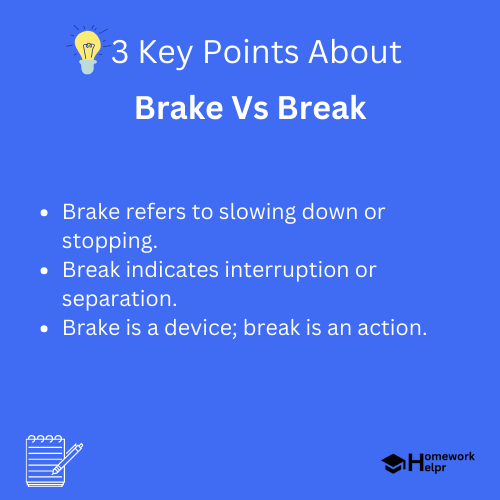📝 Summary
In English, brake and break are often confused due to similar pronunciation but have significantly different meanings. The term brake generally refers to a device used in vehicles to slow down or stop motion, and it can also refer to the action of using this device. In contrast, break can denote an interruption in activity or the act of causing something to separate. Understanding these distinctions is essential for clear communication, particularly in writing and conversation. Practicing their correct usage enhances effective communication skills.
Brake vs Break: Understanding the Difference
In the English language, the words brake and break are often confused due to their similar pronunciation, yet they hold significantly different meanings. Understanding these two words is crucial for effective communication, especially in writing and conversation. Let‚’ delve into the spectacular world of these two words to grasp their distinct roles in our language.
What is a Brake?
The term brake functions primarily as a noun and a verb, closely associated with the concept of slowing down or stopping motion. Most commonly, it refers to the device used in vehicles to reduce speed or stop completely. For instance, a car uses brakes to halt when approaching a red light.
When we use brake as a verb, it implies the action of using a brake. For example, when you apply the brake pedal in your car, you are engaging the braking system to slow down or stop. Let‚’ break down its applications:
- Noun Example: The brake on my bicycle is malfunctioning.
- Verb Example: Please brake slowly as we approach the stop sign.
Definition
– Malfunctioning: Not functioning properly.

What is a Break?
On the other hand, break also serves as both a noun and a verb, but with a range of meanings. As a noun, it often refers to an interruption or a pause in an activity. For example, you might take a break during study sessions to refresh your mind.
As a verb, break means to cause something to separate into parts or to stop functioning. It can apply to physical objects or even abstract concepts, like breaking a habit. Here are some examples to illustrate this:
- Noun Example: Let‚’ take a break after this chapter.
- Verb Example: I accidentally break my phone screen.
Definition
– Interrupt: To stop something for a period of time.
Key Differences Between Brake and Break
To summarize the distinct uses of brake and break, let us point out some key differences:
- Braking: Used in the context of slowing down or stopping.
- Breaking: Used in terms of interrupting or causing damage.
- Action vs Device: ‘Brake’ can refer to the device in vehicles, while ‘break’ can refer to the act of breaking or pausing.
❓Did You Know?
Did you know that the first car brakes were made of wood and cloth materials? They were not very effective compared to modern brakes!
Common Mistakes and How to Avoid Them
Learning the difference between these two words can be particularly challenging for students. A common mistake is using one in place of the other, often leading to confusion in writing. Here are some helpful tips to avoid these errors:
- When discussing vehicles, always use brake.
- If referring to an interruption, choose break.
- Remember, you apply a brake, but you take a break.
Definition
– Confusion: Lack of understanding, with unclear distinctions between two or more items.
Examples in Context
To solidify understanding, contextual examples are beneficial. Below are scenarios using both terms:
Examples
Imagine you are riding your bicycle downhill. You suddenly realize you are going too fast and need to stop quickly. You apply the brake to slow down before reaching the intersection.
Examples
In a different situation, you might say, ‚ÄúLet‚’ take a five-minute break from our homework to relax before continuing.”
Conclusion
In conclusion, brake and break are two entirely different words that can affect the clarity of your communication. Whether you‚Äôre discussing mechanical brakes used in vehicles or taking a break to recharge your mind, being aware of their meanings will tremendously enhance your writing and speaking skills. Understanding the right context and usage allows us to express ourselves more accurately, making our communication effective and enjoyable. So, let‚’ remember: to stop something, we use the brake, and to interrupt or damage something physically or metaphorically, we take a break.
Keep practicing these differences, and soon you’ll master the art of using these terms correctly and confidently!
Related Questions on Brake Vs Break
What is the primary use of brake?
Answer: To slow down or stop motion.
What does break mean as a noun?
Answer: It refers to an interruption or pause.
How can I avoid confusion between the two?
Answer: Remember brake for vehicles, break for interruptions.
Can both brake and break function as verbs?
Answer: Yes, both can be used as verbs with different meanings.
